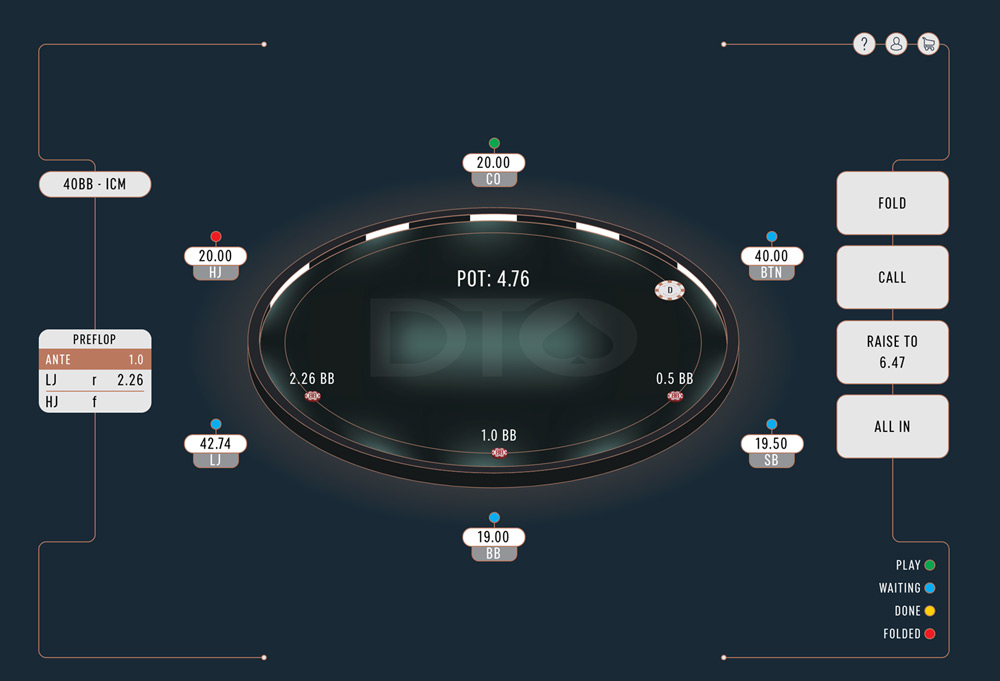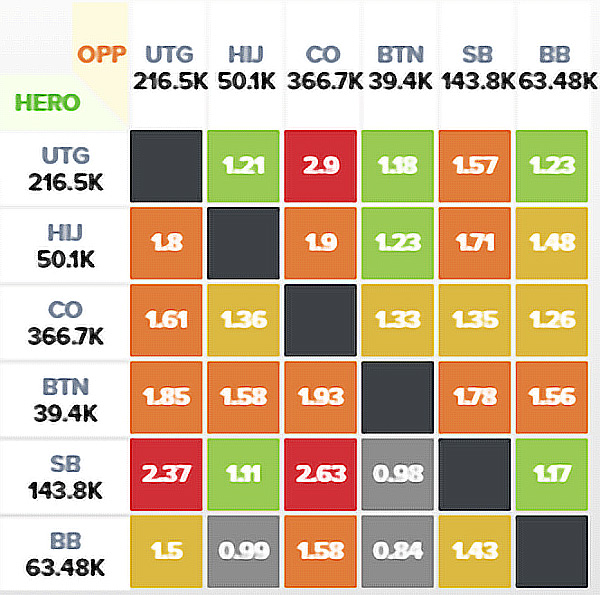2 things players get wrong about ICM poker and how to fix them
A brief look at 2 of the most common ICM errors that leave chips on the table
By Brandon Wilson
ICM situations pose a unique challenge to poker players, even highly skilled winners in chip EV environments. There are theoretically infinite permutations of final table stack distributions and payout structures, making strategic precision in ICM poker difficult and useful heuristics elusive. The good news is DTO has carved out two common mistakes you can stop making today.
Calling too much under ICM pressure
One of the most common examples of this is exhibited when a player calls a larger stack’s open when there are significantly shorter stack(s) than his present. While it may be tempting to take, for example, a suited broadway hand post-flop in position, the reality is the covered stack will not realize equity as effectively as it is accustomed to in the chip EV environment. Its post-flop aggression will be handicapped and defense frequencies facing bets slashed.
An additional pre-flop disadvantage is that the calling player will not be able to defend effectively against all-in squeezes as risk premiums are introduced, especially if her range is capped.
Consider the following example from DTO Preflop:


In this example, the Lojack has opened and the action has folded to the Cutoff on 20 big blinds. Many players in this spot and similar ones employ a calling range. But without any reliable exploitative reads, such a deviation would be strategically inaccurate.

The chart shows that, even without any significantly shorter stacks at the table, the CO continuing range contains ~0.2% calls— a figure that, if forced to 0%, should result in negligible, if any EV loss for the CO. In other words, no flatting.
Furthermore, the problem of over calling is commonly exposed when facing opens from the Big Blind. Many players too closely replicate chip EV calling ranges, which can result in EV losses fit for everything from a small inaccuracy to a large blunder, depending on the given stack distribution. To plug this leak, we strongly recommend using DTO Preflop to drill and study some of the most widely applicable Big Blind defense situations.
Mishandling ICM Risk Premiums
Precisely determining a risk premium, or additional equity needed to make a call for one’s entire stack, takes practice. It involves drilling different final table stack distributions, payout structures and bubble factors, and like most development in poker, requires doing a lot of your own work. In this article, we will limit the scope to introducing the term, which has very simple practical implications.

In this example, ICMIZER has assigned bubble factors for each player against every other player at the table. At a bubble factor of 1, a player would call with a range dictated by raw pot odds. However, as this figure increases to, say, 1.3, the player would now need to call with a range that satisfies pot odds + 7%. In reverse, with a bubble factor of < 1, we will see technically losing calls with respect to requisite pot odds due to the potential future EV of having a stack size that includes winning the pot in question.
To improve at determining what bubble factors are situationally appropriate and the corresponding risk premiums to consider, we recommend practicing with software that produces BFs and their corresponding risk premiums.
In conclusion
While ICM poker game trees are vast, so, too, are the potential rewards of sharpening one’s skill in them. The large majority of poker tournament prize money is distributed under ICM conditions, and as such, we recommend ICM study reside atop tournament players’ study agendas.
To start improving your ICM game today, subscribe to DTO Poker for both preflop and postflop ICM study.
About the author
Brandon Wilson is an American poker player and writer. He earned his Journalism degree from Northwestern University’s Medill School of Journalism, and after spending three years in the field, found poker. He credits DTO as instrumental to his improvement and uses the tool regularly. Outside of the game, Brandon teaches yoga and serves as a mentor for high school students for the Daniel Murphy Scholarship Foundation.